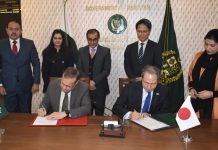By Ali Imran
ISLAMABAD: The Pakistan Environmental Protection Agency (Pak-EPA) has announced a sweeping new Vehicular Emission Control Action Plan (VECAP) aimed at curbing air pollution and smog in the capital, in what officials described as a major step towards cleaner, healthier urban air.
The plan, launched under the supervision of the Ministry of Climate Change and Environmental Coordination, sets out a framework for stricter emissions enforcement, cleaner fuels, and the gradual electrification of transport across the Islamabad Capital Territory. It has been developed in coordination with the ICT Administration, Islamabad Transport Authority, and Traffic Police.
Talking to media on Sunday, Muhammad Saleem Shaikh, spokesperson for the Ministry, said the initiative represents “a structured, long-term roadmap that moves beyond temporary measures by combining enforcement, innovation and public engagement.”
He warned that vehicular emissions — now one of the capital’s leading sources of air pollution — are releasing harmful levels of carbon monoxide, nitrogen oxides, hydrocarbons and fine particulate matter (PM2.5), contributing to respiratory and cardiovascular diseases.
Under the short-term phase (0–18 months), Pak-EPA and the Islamabad Traffic Police will launch regular roadside inspections to ensure compliance with National Environmental Quality Standards (NEQS).
All government transport fleets will be required to meet 100 per cent compliance, while private and commercial vehicles must undergo third-party emissions testing through certified laboratories. Compliance certificates will be linked to vehicle registration and ownership transfer.
Public awareness drives will also be rolled out via television, radio and digital media to encourage proper vehicle maintenance and discourage smoke-emitting vehicles. Recent monitoring campaigns led to fines for 215 vehicles and the impounding of 32 for exceeding emission limits.
Mr Shaikh said special attention will be given to diesel-run buses, trucks and water tankers, while petrol vehicles will be checked for catalytic converters. Open burning of solid waste is banned, with violators penalised under the Pakistan Environmental Protection Act.
“Cleaner air cannot be achieved by enforcement alone,” he cautioned. “Citizens, institutions and transporters all have a role to play in supporting cleaner mobility and sustainable practices.”
The long-term phase (18–60 months) will focus on transforming Islamabad’s transport system through a Comprehensive Electric Vehicle Promotion Programme (EVPP). Charging stations will be established across the city, a 10 per cent quota of EVs will be introduced in government fleets, and incentives such as tax exemptions and dedicated EV lanes will be offered.
A Fuel Quality Upgradation Initiative will ensure the transition to Euro-5 fuels by 2027 and Euro-6 by 2030, while a Vehicle Retirement Policy will phase out older, high-emission vehicles. Owners will be encouraged to retire vehicles older than 10–15 years through financial incentives, with mandatory fitness tests for vehicles over five years old.
“The ultimate goal is to make Islamabad a model city for clean and climate-smart transport,” Mr Shaikh said. “This plan reflects Pakistan’s wider commitment to sustainable urban air quality and reduced greenhouse gas emissions.”
Implementation will rely on joint coordination between Pak-EPA, the ICT Administration, the Excise and Taxation Department, the Capital Development Authority (CDA), the Oil and Gas Regulatory Authority (OGRA) and the Islamabad Traffic Police.
Mr Shaikh stressed that the success of the plan depends on “sustained institutional support, effective cooperation and active citizen participation”.
If fully implemented, the new roadmap would make Islamabad the first Pakistani city to align its transport emissions policy with modern international environmental standards, setting an example for other urban centres to follow.






